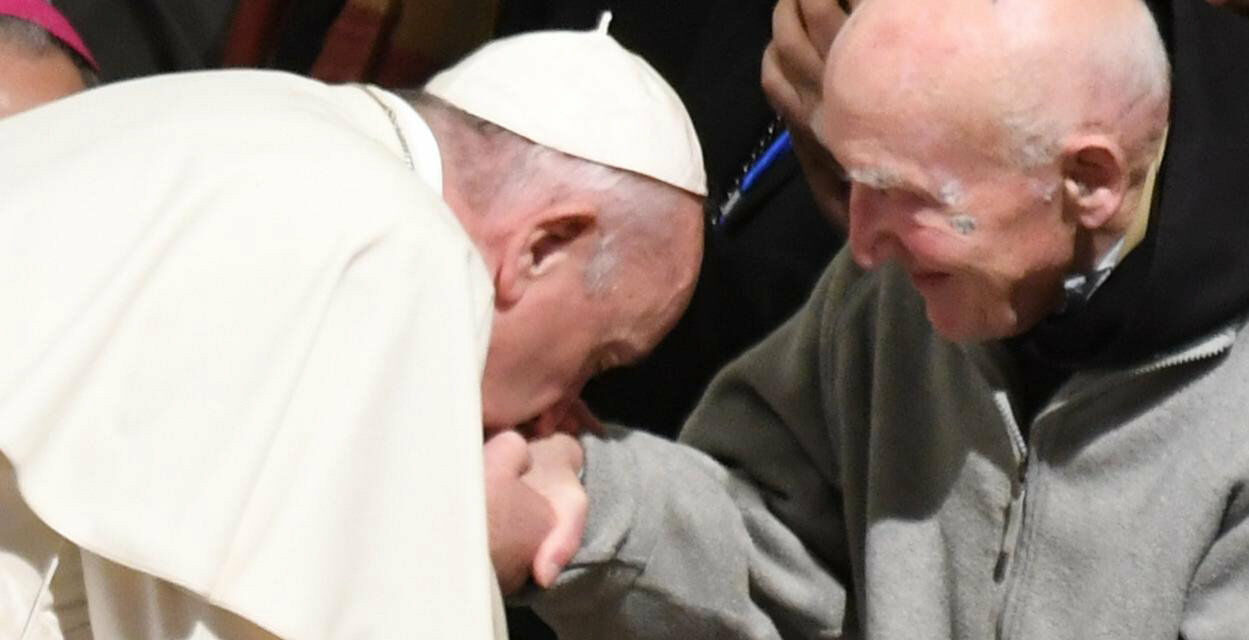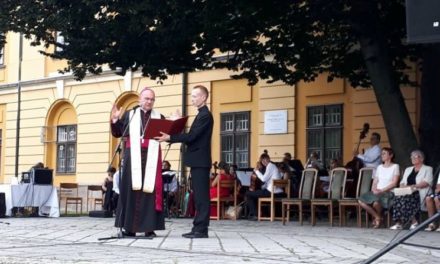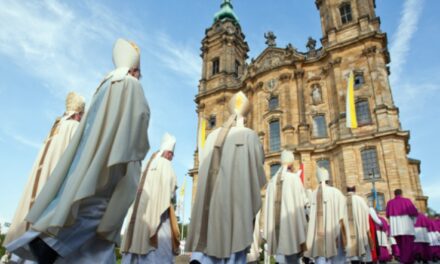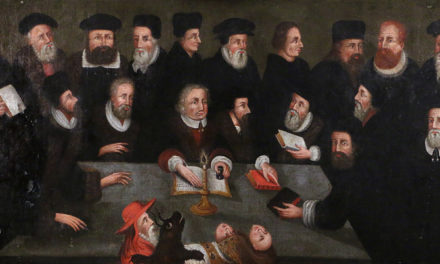The Holy Father is the Vatican VI. Pál Hall on the morning of February 9, continuing his catechesis series on St. Joseph, he reflected on St. Joseph as "the patron saint of a good death" in his speech in Italian. He highlighted the positive effect of keeping death in mind: we see life differently and live differently if we always think about the inevitability of our death.
We publish the translation of the entire catechesis of Pope Francis.
Dear brothers and sisters, I wish you a good day!
In the last catechesis, again inspired by the figure of Saint Joseph, we thought about the meaning of the communion of saints. Based on this, today I would like to talk about the special reverence that the Christian people have always felt for St. Joseph as the patron saint of a good death. This devotion was born from the idea that Joseph could have died in the presence of the Virgin Mary and Jesus before Jesus left the Nazareth house. There are no historical data, but since we no longer see Joseph during Jesus' public activity, it was thought that he died there in Nazareth, surrounded by his family. Jesus and Mary accompanied him in his death.
A century ago XV. Pope Benedict wrote that "through Joseph we get directly to Mary, and through Mary to the origin of all holiness, to Jesus." Both Joseph and Mary help us to go to Jesus. Among the devotional exercises performed in honor of St. Joseph, he especially recommended one, writing: "Since he is rightly considered the most effective protector of the dying, since he died in the presence of Jesus and Mary, the holy shepherds should take care to encourage and encourage those [...] the pious societies formed to plead with Joseph on behalf of the dying, such as the "Good Death", the "Departure of Saint Joseph" and the "For the Dying" (Bonum sane motu proprio, July 25, 1920): these were contemporary associations. My dear brothers and sisters, perhaps some of you think that this language and this topic is just a legacy of the past, but in fact our relationship with death is never about the past, but always present. XVI. A few days ago, Pope Benedict said of himself that he was "standing before the dark gates of death".
We should thank Pope Benedict, who at the age of ninety-five has the clarity to tell us: "I stand before the darkness of death, before the dark gate of death." He gave us good advice!
The culture of so-called "well-being" tries to erase the reality of death, but the coronavirus pandemic has dramatically brought it back to the fore. It was terrible: death was everywhere and so many of our brothers and sisters lost their loved ones without being near them, and this made it even more difficult to accept and process death. A nurse told how a grandmother who was dying of coronavirus told her: "I want to say goodbye to my loved ones before I go." And the brave nurse took the cell phone and connected it to her family. The presence of tender love at that farewell…
Nevertheless, we try in every way to banish the idea of our finitude, and by doing so we believe that we are taking away the power of death and banishing fear.
However, the Christian faith does not drive away the fear of death, but helps to face it. We all walk through that door sooner or later.
The true light that illuminates the mystery of death comes from the resurrection of Christ. This is the light. Saint Paul writes: "If we proclaim that Christ has risen from the dead, how can some of you say that there is no resurrection? If there is no resurrection, then Christ has not risen either. And if Christ has not risen, our teaching has no meaning, and your faith has no meaning either" (1 Cor 15:12-14). There is only one certainty: Christ is resurrected, Christ is resurrected, Christ lives among us! This is the light that awaits us behind the dark gates of death.
My dear brothers and sisters, it is only through faith in the resurrection that we can face the abyss of death without being overcome by fear. But it's not just about that: we can also restore the positive role of death. Thinking about death illuminated by the mystery of Christ helps us to look at the whole of life with new eyes. I've never seen a moving truck behind a hearse! Behind a hearse: I've never seen it! We go alone, nothing in the pockets of the blindfold: nothing. Because there are no pockets on the eye cover. This is the loneliness of death: so true
I've never seen a moving truck behind a hearse. There's no point in hoarding if we're going to die one day. What we need to accumulate is love, the ability to share, the ability not to be indifferent to the needs of others.
Also: what's the point of arguing with a sibling, a friend, a family member, or a fellow believer if one day we're going to die? What is the point of being angry, being angry with others? Faced with death, many questions come into a new light. It is good to die reconciled, leaving neither resentment nor sorrow behind! I would like to state a truth: we are all on our way to the gate, all of us!
The gospel says that death comes like a thief. This is what Jesus says: he comes like a thief, and no matter how much we try to control his arrival, perhaps by planning our own death, it remains an event that we must reckon with and make decisions about.
For us Christians, two more considerations are important.
The first is that we cannot avoid death, and that is why, after we have done everything humanly possible to cure the patient, stubbornness in therapy is immoral (cf. Catechism of the Catholic Church, 2278). This sentence of God's faithful people, the simple people: "Let him die in peace", "help him die in peace": what wisdom!
The second consideration concerns the quality of death itself, the quality of pain and suffering. We should be grateful for all the help that medical science tries to provide, so that all people who are about to live the last phase of their life can do so in the most humane way possible, within the framework of the so-called "palliative care". However, we must be careful not to confuse this assistance with the also unacceptable assistance in death, which leads to murder.
We must accompany people to death, but we must not cause death or assist in any form of suicide.
I would like to remind you that the right to care and access to care for all must always be prioritized so that the most vulnerable, especially the elderly and the sick, are never swept aside. Life is a right, but death is not, it must be accepted, not promoted. And this ethical principle affects everyone, not just Christians or believers.
However, I would like to highlight a social but real problem here. This "design"—I don't know if that's the right word—is to hasten the death of the elderly. We often see in a certain social stratum that the elderly, because they do not have the means, receive less medicine than they need, and this is inhumane: this is not help, but rather leading them to die as soon as possible. This is not human and not Christian. The elderly should be cared for as the treasures of humanity: they are our wisdom. Even if they do not speak, and even if they are not conscious, they are still symbols of human wisdom. They are the ones who went before us and left us so many beautiful things, so many memories, so much wisdom.
Please don't isolate the elderly, don't hasten the death of the elderly. There is the same hope attached to caressing an elderly person as to caressing a child,
because the beginning and the end of life are always a mystery, a mystery that must be respected, accompanied, cherished and loved.
May Saint Joseph help us to live the mystery of death as best as possible! For a Christian, a good death is the experience of God's mercy, which comes close to us even at the last moment of our life. In the Hail Mary prayer, we also ask Our Lady to be close to us "at the hour of our death". That is why I would like to close this catechesis by praying together to Our Lady for the dying, for those who are about to cross this dark gate, and for the grieving family members. Let's pray together: Hail Mary...
Calls
I would like to thank all the people and communities who joined the prayer for peace in Ukraine on January 26. Let us continue to pray to the God of peace that tensions and threats of war will be overcome through serious dialogue, and that the "Normandy format" negotiations can also contribute to this. Remember: war is madness!
Tomorrow, February 11, we will celebrate World Patients' Day. I would like to remember our dear patients so that everyone can be provided with health care and spiritual support. Let us pray for these brothers and sisters, their families, health and pastoral workers, and all those who care for them.
Featured image: Pope Francis greets Father Jean-Pierre Schumacher, one of the survivors of the 1996 Tibhirine massacre, at St. Peter's Cathedral in Rabat on March 31, 2019. MTI/EPA/ANSA/Ciro Fusco












